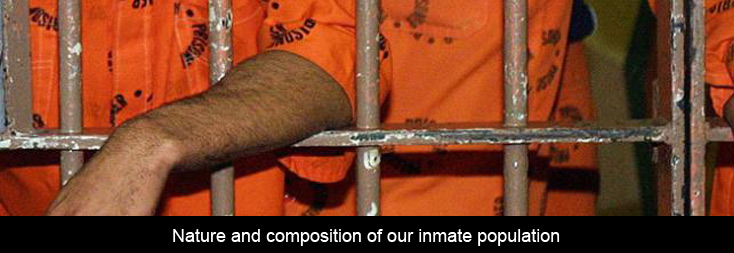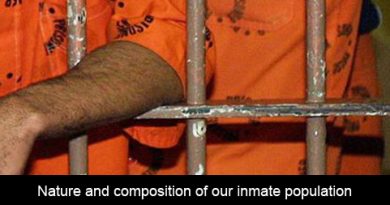Correctional Services Minister calls on managers to accelerate implementation of service delivery programmes

Correctional Services Minister Sibusiso Ndebele has called upon senior managers in the Department of Correctional Services (DCS) to accelerate implementation of service delivery programmes.
Minister Ndebele was earlier today (16 January) addressing the opening session of a three-day DCS Lekgotla in KwaZulu-Natal, being attended by the Minister, Deputy Minister, National Commissioner (Director-General) and 14 Chief Deputy Commissioners (Deputy Directors-General), including Regional Commissioners.
Delivering his address, Minister Ndebele said: “As the Department of Correctional Services (DCS), it is significant that we are responsible for people who are, individually, going through agonizing decisions of whether they are still going the old way – merely perfecting their life of crime – or are entering the road to Damascus to undergo a transmogrification and begin a law-abiding life. In other words, recidivism or a crime-free life.
“As we gather here as the DCS family, let us be reminded that all recorded history teaches us one clear lesson: freedom will not last unless it’s coupled with order. Order can exist without freedom, but freedom can never exist without order. That freedom and order may co-exist, it is essential that freedom should be exercised under authority and order should be enforced by authority. The enforcement of order should always be guided by the principle of legality, necessity and proportionality. In terms of the Constitution, authority is vested in the Executive popularly known as the government. The Prisons and Reformatories Act, Act 13 of 1911, introduced a formal prison system in South Africa 102 years ago. DCS constitutes the final expression of statehood. There can be no excuses for services not to be delivered and complacency.
“We want to declare 2013 as The Year of the Correctional Official. The Correctional Official is the heart and soul of DCS. As stated in the White Paper on Corrections, corrections is a multi-faceted profession which requires knowledge of social work, psychology, nursing, pharmacology, health and theology. The ideal Correctional Official should embody the values that DCS hopes to instil in the offender, as it is this official who is to assist and facilitate the rehabilitation processes of the offender. An attitude of serving with excellence, a principled way of relating to others and, above all, a just and caring attitude are essential ingredients of the behaviour of a Correctional Official. A caring attitude requires a principled display of qualities such as integrity, honesty and sound work practices; adherence to the departmental code of conduct; and general disassociation with all forms of corruption and unethical conduct. There are more risks for a Correctional Official than most jobs. The population that they work with in the prison system is much more dangerous than the general public. Although education and training are required to work in this environment, just one little mistake can be very risky for a Correctional Official. Nevertheless, a Correctional Official prepares inmates for successful rehabilitation, re-entry and reintegration.
“As of last Monday (7 January), the Groenpunt riot kept us all busy. Whilst riots instigated by inmates in correctional centres will not be tolerated, we are extremely grateful that no official, or inmate, was killed at Groenpunt. We want to convey our thanks, and appreciation, to our National Commissioner Mr. Tom Moyane, COO Ms. Nontsikilelo Jolingana, the Regional Commissioner for the Free State/Northern Cape Ms. Subashni Moodley, Deputy Regional Commissioner Ms. Grace Molatedi, all CDCs, RCs, DRCs, DCs, our Correctional Officials who put their lives at risk every day, the South African Police Service and all other emergency services for their swift response to the Groenpunt incident. Special thanks go to members of the DCS Emergency Support Teams for their determination to act promptly and defend democratic order with their lives. It is difficult to mention each person, by name and rank, but to all those who made a contribution, no matter how big or small, thank you.
“DCS must remain fully committed to a caring and just society, enjoining all of us to afford those who err against society the opportunity to correct their ways under humane conditions. We must go all out to rehabilitate those seeking opportunities for change in their lives. We must be passionate about galvanising understanding for our transformative agenda from prisons to corrections, and preparing offenders to be reintegrated as functional members of society.
“In 2007, both the Democrats and Republicans in the United States sponsored a unique legislative proposal to expand re-entry services for people leaving prison and returning to society. The Second Chance Act repudiates the notion that recidivism reduction is best achieved through deterrent threats alone, and calls for the delivery of services to former prisoners not in a minimal or grudging way but in a systematic, progressive fashion. It is a re-entry movement that could be classified as therapeutic jurisprudence, restorative justice and to some extent victims’ rights. It provides programmes and services that will aid rehabilitation efforts and encourage positive participation in society upon release. It eliminates ‘invisible punishment’ by excluding access to public benefits such as social grants, general assistance, housing and jobs. The Act will counter the effects of get tough on crime policies which have made it extremely difficult for ex-offenders to re-enter the normative non-criminal community and could explain why there are so many recidivists. Together with the Victim-Offender Dialogues, this will be one of our flagship programmes this year. Our responsibility is to keep those who by law are supposed to be inside. But unlike a train driver, our task is not limited to ensuring that they are properly inside but rather that they are properly rehabilitated. But that task does not end with them leaving the prison gates. It is still our responsibility to ensure that they do not re-offend. The Second Chance Act will assist in this task.
“We must ensure that rehabilitation programmes impact the hearts, heads and hands of offenders. We must work towards turning our prisons into learning centres, and we want offenders to read, study and work. We must reinforce corrections programmes through music, reading for redemption, creative literature, the arts, cultural events, heritage renewal events, sporting events, formal education and acquisition of skills, economic renewal through cooperatives and enterprise development, spiritual growth and self-correcting interventions, among others.
“As we enter 2013, we must have a clear road map for DCS. Let us commit ourselves towards ensuring that the morale of the DCS cadre is high. It will be higher if we are able to communicate our policies, and plans, comprehensively at all levels. No official should feel that they are not being heard. They should know that they will be listened to, as they make use of legitimate channels of communication.
“Incarceration should not signify civic death. Inmates are also people who have constitutional rights, though curtailed. We should be able to re-socialize offenders by restoring their self-respect, which will enhance their respect for other people and, therefore, create a new human being.
“That our offender population has remained constant, whether you remove pass laws, group areas or apartheid laws, should make us search more urgently for answers to the high prison population in South Africa,” said the Minister.




